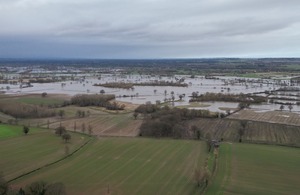River Severn Partnership consulting on innovative water management strategy for Upper Severn Valley
News with our partners River Severn Partnership
The Environment Agency and Natural Resources Wales, alongside Shropshire Council and Powys County Council, working as the River Severn Partnership, have released their proposal for how plans will be progressed to make the River Severn a more vibrant and resilient river catchment.
The Environment Agency and Natural Resources Wales are gathering local views on a new approach to managing water in the Upper Severn Valley.
These proposals will form part of a Severn Valley Water Management strategy to deliver a long-term sustainable plan for the communities who live and work in the Severn catchment on both sides of the England-Wales border.

Hayes Basin in Shropshire
For the next six weeks they are inviting the community to share their views on the long-term approach for the area via a new consultation. It will set out a vision for the Severn and outline a proposed approach to strategy development, that will contribute towards reducing flood risk and increasing water security. The strategy will also support communities and nature locally and provide a boost to the local economy.
This consultation is being run by the Severn Valley Water Management Scheme, which is led by a partnership of the Environment Agency, Natural Resources Wales, Shropshire Council and Powys County Council. It is being developed in response to significant flooding of the River Severn in recent decades which has damaged homes and businesses, impacted local infrastructure and disrupted travel. This project aims to better protect over 3,000 homes and 1,000 businesses from flood risk across the upper Severn catchment in England and Wales.
The project also seeks to support the management of long-term water resources, with recent periods of prolonged dry weather having resulted in the need for action to minimise the environmental damage from low water flows. As an example of these extremes, in 2022 the Upper Severn catchment went from winter flooding to drought within the space of eight months, with groundwater and reservoir stores being used to support the people and wildlife who depend on the water supply provided by the Severn.
To help address these issues, the Severn Valley Water Management Scheme is adopting a regenerative approach, meaning that interventions will seek to positively contribute to addressing the climate crisis and halting biodiversity decline, whilst also providing significant flood risk benefits. It will investigate interventions including natural flood risk management measures that slow the flow of water upstream, such as the creation of leaky dams and land management practices, as well as engineered solutions such as the construction of flood storage areas and embankments.
The Severn Valley Water Management Scheme team have already undertaken scoping work to better understand the potential scale of both nature-based and engineered interventions that might be required to enable effective water management across the area, upstream of Shrewsbury.
David McKnight, Flood and Coastal Risk Manager at the Environment Agency, said:-
“Delivering the Severn Valley Water Management Scheme is a long-term solution to sustainable water management, and we are right at the beginning of a complex journey to achieve our vision.
“We are looking forward to developing and testing options in collaboration with partners and communities across England and Wales in 2024 as we begin the consultation.
“We want to hear from all areas of the Severn community as we embark on the transformation programme that the catchment needs to be able to adapt to our changing climate and continue to thrive.”
Gavin Bown, Natural Resources Wales’ Head of Operations for Mid Wales, said:-
“The impact of flooding can be devastating for communities, and the reality of the climate crisis means that we have to adapt to extreme weather conditions in the future.
“We are a partner of the Severn Valley Water Management Scheme because it has the potential to enhance our work to reduce flood risk to communities in north Powys while also providing important benefits for nature and the environment.
“This consultation is an important step in learning about what is important for communities across the catchment, and it will influence how we move forward to protect people and the local environment.”
The closing date for the consultation is Tuesday 21 May 2024. To take part click here.
If you require a paper copy of the consultation, please call 03708 506506 to request a copy of the information to be posted.
About the Severn Valley Water Management Scheme
The scheme is also actively supported by a whole range of other partners from across the River Severn geography: the River Severn Partnership. The partnership is a pioneering and transformational partnership bringing together multiple organisations, resources and skills to drive resilient and sustainable futures along Britain’s longest river network.
In addition, a number of expert consultancy teams are providing critical contributions, with Arup providing design and strategy development input under the Environment Agency’s Collaborative Delivery Framework.
About the strategy
The proposed approach has received support from the Welsh Government and the Department for Environment, Food and Rural Affairs (Defra), providing a firm basis from which the project can now progress.
Severn Valley Water Management Scheme is already working closely with several partners to consider how we might maximise opportunities through this integrated approach to water management. Working alongside Severn Trent Water and Water Resources West, as well as environmental groups such the Wildlife Trust and Rivers Trust, we are considering new approaches to ensure that the project not only reduces flood risk but also contributes towards longer term water availability and supports biodiversity, habitat recovery and climate resilience.
Severn Valley Water Management Scheme is beginning a period of community engagement in spring 2024, starting with this initial consultation. There will be lots of other opportunities for local communities to help shape the strategy, further details on the engagement programme that will follow will be published on our website in due course.

